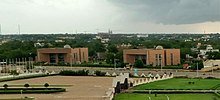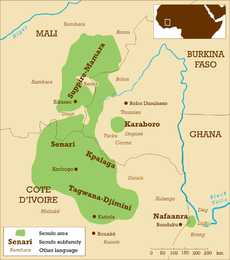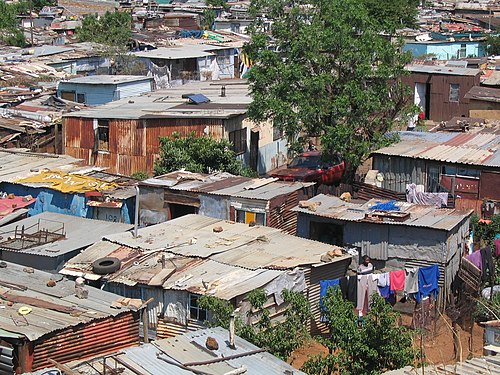Portal:Africa



Africa is the world's second-largest and second-most populous continent after Asia. At about 30.3 million km2 (11.7 million square miles) including adjacent islands, it covers 20% of Earth's land area and 6% of its total surface area. With nearly 1.4 billion people as of 2021, it accounts for about 18% of the world's human population. Africa's population is the youngest among all the continents; the median age in 2012 was 19.7, when the worldwide median age was 30.4. Based on 2024 projections, Africa's population will reach 3.8 billion people by 2099. Africa is the least wealthy inhabited continent per capita and second-least wealthy by total wealth, ahead of Oceania. Scholars have attributed this to different factors including geography, climate, corruption, colonialism, the Cold War, and neocolonialism. Despite this low concentration of wealth, recent economic expansion and a large and young population make Africa an important economic market in the broader global context. Africa has a large quantity of natural resources and food resources, including diamonds, sugar, salt, gold, iron, cobalt, uranium, copper, bauxite, silver, petroleum, natural gas, cocoa beans, and.
Africa straddles the equator and the prime meridian. It is the only continent to stretch from the northern temperate to the southern temperate zones. The majority of the continent and its countries are in the Northern Hemisphere, with a substantial portion and a number of countries in the Southern Hemisphere. Most of the continent lies in the tropics, except for a large part of Western Sahara, Algeria, Libya and Egypt, the northern tip of Mauritania, and the entire territories of Morocco, Ceuta, Melilla, and Tunisia, which in turn are located above the tropic of Cancer, in the northern temperate zone. In the other extreme of the continent, southern Namibia, southern Botswana, great parts of South Africa, the entire territories of Lesotho and Eswatini and the southern tips of Mozambique and Madagascar are located below the tropic of Capricorn, in the southern temperate zone.
Africa is highly biodiverse; it is the continent with the largest number of megafauna species, as it was least affected by the extinction of the Pleistocene megafauna. However, Africa also is heavily affected by a wide range of environmental issues, including desertification, deforestation, water scarcity, and pollution. These entrenched environmental concerns are expected to worsen as climate change impacts Africa. The UN Intergovernmental Panel on Climate Change has identified Africa as the continent most vulnerable to climate change.
The history of Africa is long, complex, and varied, and has often been under-appreciated by the global historical community. In African societies the oral word is revered, and they have generally recorded their history via oral tradition, which has led anthropologists to term them oral civilisations, contrasted with literate civilisations which pride the written word. During the colonial period, oral sources were deprecated by European historians, which gave them the impression Africa had no recorded history. African historiography became organized at the academic level in the mid-20th century, and saw a movement towards utilising oral sources in a multidisciplinary approach, culminating in the General History of Africa, edited by specialists from across the continent. (Full article...)
Selected article –
GhanaSat-1 was the first Ghanaian nanosatellite to be launched into space. It was designed and built in two years in conjunction with the Kyushu Institute of Technology Birds-1 program, which has the goal of helping countries build their first satellite.
The satellite took images, collected atmospheric data, measured space radiation, and transmitted uploaded audio. GhanaSat-1 was launched to the International Space Station (ISS) on a Falcon 9 rocket. It was released into space from the Nanoracks CubeSat Deployer on the ISS on 7 July 2017 and was used to monitor environmental activities along Ghana's coastline. The satellite deorbited on 22 May 2019. (Full article...)
Featured pictures –
Did you know (auto-generated) -

- ... that activist Gerlin Bean co-founded the Organisation of Women of African and Asian Descent in 1978, an event described as "a watershed in the history of Black women's rights activism"?
- ... that in 1888, Edward P. Duplex became the first African American to be elected a mayor in California?
- ... that South African president Jacob Zuma requested a tour of a Sainsbury's supermarket during his state visit to the United Kingdom in 2010?
- ... that The Red Moon was the first Broadway show to depict alliances between African Americans and Native Americans?
- ... that many African countries provide for legal abortion in their reproductive health laws, but such laws have been passed without grounds for legal abortion in Madagascar and in Senegal?
- ... that African porters in Salvador, Bahia, went on strike after the provincial government passed a law requiring them to wear metal identification tags?
Categories
Selected biography –
Ali Al'amin Mazrui (24 February 1933 – 12 October 2014), was a Kenyan-born American academic, professor, and political writer on African and Islamic studies, and North-South relations. He was born in Mombasa, Kenya. His positions included Director of the Institute of Global Cultural Studies at Binghamton University in Binghamton, New York, and Director of the Center for Afro-American and African Studies at the University of Michigan. He produced the 1980s television documentary series The Africans: A Triple Heritage. (Full article...)
Selected country –
 |
 |
||

| |||
Senegal (French: le Sénégal), officially the Republic of Senegal, is a country south of the Sénégal River in western Africa. Senegal is bounded by the Atlantic Ocean to the west, Mauritania to the north, Mali to the east, and Guinea and Guinea-Bissau to the south. The Republic of The Gambia lies almost entirely within Senegal, surrounded on the north, east and south; from its western coast, Gambia's territory follows the Gambia River more than 300 kilometers (190 mi) inland.
The Senegalese landscape consists mainly of the rolling sandy plains of the western Sahel which rise to foothills in the southeast. Here is also found Senegal's highest point, an otherwise unnamed feature near Nepen Diakha at 581 m (1906 ft). The northern border is formed by the Senegal River; other rivers include the Gambia and Casamance Rivers. The capital Dakar lies on the Cap-Vert peninsula, the westernmost point of continental Africa. The local climate is tropical with well-defined dry and humid seasons that result from northeast winter winds and southwest summer winds. (Read more...)
Selected city –

N'Djamena (English: /əndʒɑːˈmeɪnə/ ən-jah-MAY-nə) is the capital and largest city of Chad. It is also a special statute region, divided into 10 districts or arrondissements.
The city serves as the centre of economic activity in Chad. Meat, fish and cotton processing are the chief industries, and it is a regional market for livestock, salt, dates, and grains. (Full article...)
In the news
- 12 February 2024 –
- Two boats collide on the Congo River near Kinshasa, Democratic Republic of the Congo; with the death toll remains unclear. (AP)
- 11 February 2024 – 2023 Africa Cup of Nations
- In association football, hosts Ivory Coast win their third Africa Cup of Nations by defeating Nigeria 2–1 in the final. Sébastien Haller scores the winning goal in the 81st minute. (The Guardian)
- 10 February 2024 – Somali civil war
- Four Emirati soldiers and a Bahraini military officer are killed, while ten other people are injured, when a soldier opens fire at a military base in Mogadishu, Somalia, before being killed in the ensuing shootout. Al-Shabaab claims responsibility. (AP)
- 10 February 2024 –
- A Eurocopter EC130 helicopter crashes near Nipton, California, United States, killing all the six people on board, including Nigerian banker Herbert Wigwe. (CBS News)
- 10 February 2024 – 2023–2024 Senegalese protests
- Violent protests occur in Senegal following an announcement by President Macky Sall that presidential elections have been delayed from February 25 to December 15. (Sky News)
- 9 February 2024 –
- At least 18 people are killed during a collision between a bus and a truck on a road in Kinshasa, Democratic Republic of the Congo. (AP)
Updated: 16:33, 14 February 2024
General images -
Africa topics
More did you know –
- ...that Iyabo Obasanjo-Bello, a Nigerian Senator from the People's Democratic Party, is the daughter of former President Olusegun Obasanjo?
- ...that the 2007 South Africa miners' strike, which impacted over 240,000 workers, was the first ever industry-wide miners' strike in the history of South Africa?
- ...that Seleh Leha, a town in Tigray Region in northern Ethiopia, was the site of a leprosarium built during the Italian occupation of East Africa and abandoned in 1941?
- ...that Sarir field, an oil field in Cyrenaica operated by the Arabian Gulf Oil Company (AGOCO), is considered to be the largest in Libya, with estimated oil reserves of 12 Gbbl (1.9×109 m3)?
Related portals
Major Religions in Africa
North Africa
West Africa
Central Africa
East Africa
Southern Africa
Associated Wikimedia
The following Wikimedia Foundation sister projects provide more on this subject:
-
Commons
Free media repository -
Wikibooks
Free textbooks and manuals -
Wikidata
Free knowledge base -
Wikinews
Free-content news -
Wikiquote
Collection of quotations -
Wikisource
Free-content library -
Wikispecies
Directory of species -
Wikiversity
Free learning tools -
Wikivoyage
Free travel guide -
Wiktionary
Dictionary and thesaurus























































































